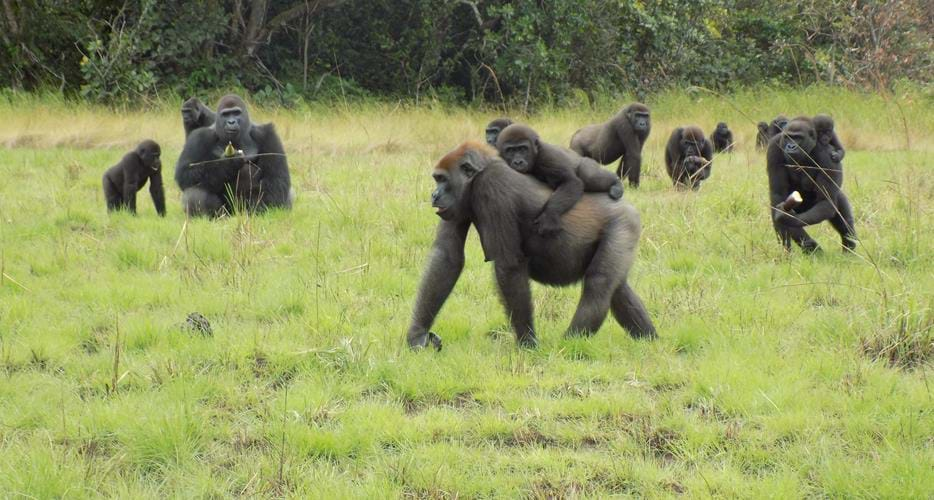Preserving wildlife and natural resources
Collaborating with local communities in the Lésio-Louna Reserve
The Aspinall Foundation has established and managed a Gorilla Protection Programme in the Lésio-Louna Reserve since the creation of the protected area in 1999. Due to the programme we are not only able to support a viable population of Critically Endangered western lowland gorillas following the success of our reintroduction programme, but we are also working to protect and strengthen the biodiversity of the reserve.
Classified as category IV by the IUCN, Lésio-Louna has the capacity to support a rich and diverse variety of wildlife but it is also exposed to the pressures of human activities. Such pressures arise from the unsustainable use of natural resources by local communities and the damage caused by poaching and illegal activities with the reserve.
For more than ten years The Aspinall Foundation has worked with local people to support their move towards more sustainable farming techniques and with developing alternative income streams, including the development of eco-tourism.
With support from BIOPAMA in November 2020 we have commenced a twelve month project to further improve the protection and management of the reserve.
About the project
There are two main areas that the project will focus on:
1. Increased protection for the gorillas and the ecosystem of the reserve
2. Improvements to the quality of an existing eco-tourism infrastructure
1. Increased protection for the gorillas and the ecosystem of the reserve
through the renewal of essential field equipment and the development of staff skills.
The result will be an increase in the scope and efficiency of patrols by strengthening the operational capacities of the eco-guards who protect against poaching and illegal actions in the reserve. This will be achieved by a combination of training workshops and in the field training as well as the purchase of a vehicle to enable wider-ranging patrols and technologically advanced tools to carry out monitoring.
2. Improvements to the quality of an existing eco-tourism infrastructure
to increase revenue to self-finance not only conservation actions, but also support for further income- generating activities for local village communities.
Lésio-Louna Reserve has the potential to support a financially viable eco-tourism product that would, in the long-term, help to secure its future as a protected haven for wildlife. To improve and develop the eco-tourism enterprise which we have already initiated, this project will enable us to completely renovate the solar energy system as well as invest in a new outboard motor to strengthen access routes to the accommodation.





Managing Eco-Tourism Risk Factors to Achieve Conservation Benefits
By definition eco-tourism will bring people into the area of the reserve and the balance of risk factors requires careful consideration.
During the renovation of accommodation - The work to be carried out consists of renovating existing infrastructure and the implementation process will not result in any alteration to the ecosystem of the area. However mitigation measures in respect of noise and physical disturbance will be put in place, such as keeping the period of work on site to a minimum and carrying out as much building preparation work as possible off site. A waste management strategy is in place which provides effective recycling of any reusable waste material for the benefit of local communities whilst also ensuring any non-biodegradable waste is removed from the site and dealt with by an appropriate waste management company. Choice of materials is made with environmental considerations in mind, in terms of sourcing, durability and environmental impact when in use.
For the long-term - By managing the eco-tourism enterprise carefully the benefits to the area will include not only an income-stream to support the cost of protecting the reserve but will also provide work opportunities for local people. In addition, the presence of managed and supervised trips in and around selected areas of the reserve will act as a significant deterrent to unauthorised access to the protected area. As has been seen during periods of lockdown due to the coronavirus pandemic in 2020, the absence of authorised visits to protected areas in countries around the word has led to a significant increase in poaching and illegal activities.
The intention is to develop the eco-tourism project to have minimal negative environmental impact whilst providing a benefit to local communities and enhancing the protection of the reserve against such illegal activities.
Our Thanks
We wish to extend our thanks to administrative authorities of the Ministry, in particular the General Directorate of the Ministry of Forest Economy as well as the Directorate in charge of Wildlife and Protected Areas who have been of great support for the conservation work carried out in the Reserve.
This 12 month programme of activities is possible thanks to the financial contribution of the European Union and the ACP Group of States through the BIOPAMA Programme.
About BIOPAMA
The Biodiversity and Protected Areas Management (BIOPAMA) Programme assists the African, Caribbean and Pacific countries to address their priorities for improved management and governance of biodiversity and natural resources. BIOPAMA provides a variety of tools, services and funding to conservation actors in the African, Caribbean and Pacific (ACP) countries.
Updates
Lésio-Louna Reserve in the Republic of Congo has received the support of #BIOPAMA
The Benefits of SMART Technology on Our Conservation Programme in Lésio-Louna
We received an all-terrain vehicle for wider-ranging missions within the protected area
The Lésio-Louna Reserve – a place of beauty and potential as a wildlife haven
Regular Patrols Provide Protection for our Conservation Programme in Lésio-Louna
A Panorama Solution on our Gorilla Protection Project
Our Final Report on a Twelve-Month Project in the Republic of Congo
We are proud to be registered with the UK’s Fundraising Regulator.




